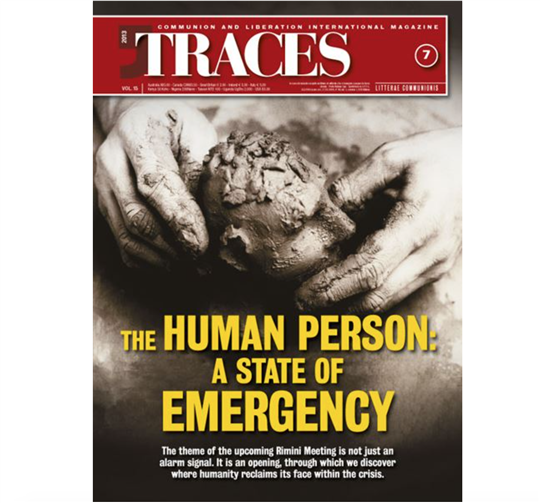
Traces N.7, July/August 2013
Our TaskWhat is our task? What are we Christians called to do here in the world? Usually, this is not the kind of question one asks before heading out on vacation. At least, not if the idea of vacation is a total break from our usual life. But the weeks ahead are not for this. They are not a parenthesis in daily life; they have never been this for us. We were never educated to this.
Vacation is a test of what one lives; in fact, of how one should live. This is the great question we have been provoked to ask by what happens and by the work of this period, in particular from the Spiritual Exercises of the Fraternity onwards. It is no coincidence that this question has been chosen as the vacation theme for many CL communities this summer. After all, in a certain sense, the theme of the Rimini Meeting–on the human person in a state of emergency, chosen a year ago but increasingly more current–coincides with this question, and with those that follow in its wake: How does faith help in responding to this state of emergency, and what task do we Christians have in the world?
This is a question Fr. Julián Carrón recently asked a group of responsibles of the Movement during a vacation. Obviously, this is not something one can answer in a few lines. It will be the focus of work for the upcoming months, and an intense work at that. But here perhaps it is worthwhile to remember at least a passage referred to in that dialogue: lived Christianity brings a difference to the world, a gusto and an intensity in doing things that “disturbs our surroundings,” as Fr. Giussani said–any surroundings, even perhaps where we spend a few days of vacation.
It was no coincidence that the first realities of the Movement throughout Italy emerged among people who travelled on vacation, maybe a difference that “disturbed” the tranquillity of the sunbathers on the Riviera of Romagna, or the mountain climbers on Alpine peaks. It emerged among people who gave and give a different answer to the question of how one should live–and eat, drink, rest, spend time with children or friends, enjoy beauty–people who live a different answer.
“The question is whether we take advantage of this moment to communicate something of the beauty that we live,” Fr. Carrón said in those days. “It is as if we were asked this very simple question: What would we like a new friend who comes with us to see? What would we desire that he bring home with him?” So then everything–hikes, a moment of testimony, the presentation of a book, a dialogue, Mass, morning prayer–becomes “an opportunity for seeing vacation as a paradigm of living, a model for a day lived in Christ, for what life is like for a person who has encountered Christ. Therefore all the gestures contain this promise, the opportunity to verify faith in experience.”
We hope that the upcoming weeks will be just this, and that in September we can recount this verification, helped by the highly precious gift the Pope has given us with his first encyclical, which has just come out (see on page 8 the article about it). It is an incomparable instrument for better understanding “what we are in the world to do,” and for loving our task. Enjoy reading, and have a good vacation.